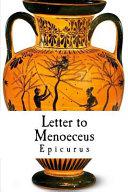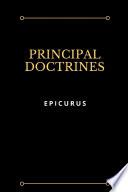Works

Letter to Menoeceus
Epicurus
Principal Doctrines
EpicurusFamous Epicurus Quotes
Sovereign Maxims
Context: It is impossible to live a pleasant life without living wisely and honorably and justly, and it is impossible to live wisely and honorably and justly without living pleasantly. Whenever any one of these is lacking, when, for instance, the man is not able to live wisely, though he lives honorably and justly, it is impossible for him to live a pleasant life. (5)
"Letter to Menoeceus" http://www.epicurus.net/en/menoeceus.html, as translated in Stoic and Epicurean (1910) by Robert Drew Hicks, p. 167
Variant translation: Let no one delay to study philosophy while he is young, and when he is old let him not become weary of the study; for no man can ever find the time unsuitable or too late to study the health of his soul. And he who asserts either that it is not yet time to philosophize, or that the hour is passed, is like a man who should say that the time is not yet come to be happy, or that it is too late. So that both young and old should study philosophy, the one in order that, when he is old, he many be young in good things through the pleasing recollection of the past, and the other in order that he may be at the same time both young and old, in consequence of his absence of fear for the future.
Context: Let no one be slow to seek wisdom when he is young nor weary in the search of it when he has grown old. For no age is too early or too late for the health of the soul. And to say that the season for studying philosophy has not yet come, or that it is past and gone, is like saying that the season for happiness is not yet or that it is now no more. Therefore, both old and young alike ought to seek wisdom, the former in order that, as age comes over him, he may be young in good things because of the grace of what has been, and the latter in order that, while he is young, he may at the same time be old, because he has no fear of the things which are to come. So we must exercise ourselves in the things which bring happiness, since, if that be present, we have everything, and, if that be absent, all our actions are directed towards attaining it.
8
Variant translation: No pleasure is itself a bad thing, but the things that produce some kinds of pleasure, bring along with them unpleasantness that is much greater than the pleasure itself.
Sovereign Maxims
Epicurus Quotes about death
35
Sovereign Maxims
20
Sovereign Maxims
40
Sovereign Maxims
The "Tetrapharmakos" [τετραφάρμακος], or "The four-part cure" of Epicurus, from the "Herculaneum Papyrus", 1005, 4.9–14 of Philodemus, as translated in The Epicurus Reader: Selected Writings and Testimonia (1994) edited by D. S. Hutchinson, p. vi
Epicurus Quotes
Sovereign Maxims
Context: Where without any change in circumstances the things held to be just by law are seen not to correspond with the concept of justice in actual practice, such laws are not really just; but wherever the laws have ceased to be advantageous because of a change in circumstances, in that case the laws were for that time just when they were advantageous for the mutual dealings of the citizens, and subsequently ceased to be just when they were no longer advantageous. (38)
31
Sovereign Maxims
Variant: Natural justice is a pledge of reciprocal benefit, to prevent one man from harming or being harmed by another.
1
Variant translations:
What is blessed and indestructible has no troubles itself, nor does it give trouble to anyone else, so that it is not affected by feelings of anger or gratitude. For all such things are signs of weakness. (Hutchinson)
The blessed and immortal is itself free from trouble nor does it cause trouble for anyone else; therefore it is not constrained either by anger of favour. For such sentiments exist only in the weak (O'Connor)
A blessed and imperishable being neither has trouble itself nor does it cause trouble for anyone else; therefore, it does not experience anger nor gratitude, for such feelings signify weakness. (unsourced translation)
Sovereign Maxims
37
Sovereign Maxims
“He who is not satisfied with a little, is satisfied with nothing.”
The Essential Epicurus : Letters, Principal Doctrines, Vatican sayings, and fragments (1993) edited by Eugene Michael O'Connor, p. 99
32
Sovereign Maxims
“Self-sufficiency is the greatest of all wealth.”
The Essential Epicurus : Letters, Principal Doctrines, Vatican sayings, and fragments (1993) edited by Eugene Michael O'Connor, p. 99
“The greatest reward of righteousness is peace of mind.”
Attributed to Epicurus by Clement of Alexandria in Stromata
This attribution occurs in chapter 13 (Ioan. Graphei, 1532, p. 494) http://books.google.com/books?id=rs47AAAAcAAJ&pg=PA494 of the Christian church father's Lactantius's De Ira Dei (c. 318):
"God," he [Epicurus] says, "either wants to eliminate bad things and cannot,
or can but does not want to,
or neither wishes to nor can,
or both wants to and can.
If he wants to and cannot, then he is weak and this does not apply to god.
If he can but does not want to, then he is spiteful which is equally foreign to god's nature.
If he neither wants to nor can, he is both weak and spiteful, and so not a god.
If he wants to and can, which is the only thing fitting for a god, where then do bad things come from? Or why does he not eliminate them?"
Lactantius, On the Anger of God, 13.19
Charles Bray, in his 1863 The Philosophy of Necessity: Or, Natural Law as Applicable to Moral, Mental, and Social Science quotes Epicurus without citation as saying a variant of the above statement (p. 41) http://books.google.com/books?id=BebVAAAAMAAJ&pg=PA41 (with "is not omnipotent" for "is impotent"). This quote appeared in "On the proofs of the existence of God: a lecture and answer questions" http://www.atheism.ru/old/KryAth2.html (1960) by professor Kryvelev I.A. (Крывелёв И.А. О доказательствах бытия божия: лекция и ответы на вопросы. М., 1960). And N. A. Nicholson, in his 1864 Philosophical Papers (p. 40), attributes "the famous questions" to Epicurus, using the wording used earlier by Hume (with "is he" for "he is") http://books.google.com/books?id=ZMsGAAAAcAAJ&pg=PA40. Hume's statement occurs in Book X (p. 186) http://books.google.com/books?id=E7dbAAAAQAAJ&pg=PA186 of his renowned Dialogues Concerning Natural Religion, published posthumously in 1779. The character Philo precedes the statement with "Epicurus's old questions are yet unanswered.…". Hume is following the enormously influential Dictionnaire Historique et Critique (1697–1702) of Pierre Bayle, which quotes Lactantius attributing the questions to Epicurus (Desoer, 1820, p. 479) http://books.google.com/books?id=QwwZAAAAYAAJ&pg=PA479.
There has also arisen a further disputed extension, for which there has been found no published source prior to The Heretic's Handbook of Quotations: Cutting Comments on Burning Issues (1992) by Charles Bufe, p. 186: "Is he neither able nor willing? Then why call him God?"
Disputed
From the esplanade wall at Oenoanda, now in Turkey, as recorded by Diogenes of Oenoanda
12
Variant translation: One cannot rid himself of his primal fears if he does not understand the nature of the universe, but instead suspects the truth of some mythical story. So without the study of nature, there can be no enjoyment of pure pleasure. http://www.epicurus.info/etexts/PD.html
Sovereign Maxims
24
Sovereign Maxims
